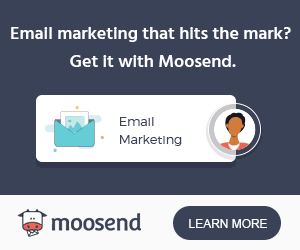Shopify vs WordPress – Which to choose for your e-commerce business?
E-commerce businesses are on the rise, and with the increasing number of options available for building an online store, it can be overwhelming when trying to choose the right platform.

WordPress can be downloaded for free through the button below.
Or contact your hosting provider for help in getting your WordPress website live.

You can get a completely $1 (£1) trial (no credit card required!) through the button below.
Build your dream site and test it before committing.
1. Ease of use
How easy is Spotify to use?
Shopify is designed specifically for e-commerce in mind and is renowned for its user-friendly interface and how simple it is to use.
The platform offers a super simple drag-and-drop builder which allows you to create a store without any coding skills whatsoever.
The platform also offers a range of out-of-the-box features, such as a built-in payment gateway, inventory management, and shipping integration, making it a piece of cake for users to manage their online store.
How easy is WordPress to use?
WordPress is what is called a content management system or CMS for short, that requires some basic technical skills to use. While the platform itself is beginner-friendly, it may take some time for users to get used to the general interface.
However it’s worth stating, WordPress does offer a huge range of plugins (such as the Elementor Pro page builder) and themes that can help users customize their online store, with out-of-the-box templates.
Overall, Shopify wins this section. It is built with e-commerce and beginners in mind and has a huge support network at the ready. WordPress, on the other hand does take a bit of getting used to.
2. Setup difficulty
How easy is Spotify to set up?
Shopify is very very simple to setup, everything is laid out where it should be and requires little technical knowledge at all.
Users can sign up for a $1 trial and set up a store in minutes. Simply choose a theme, add products, set up payments and shipping methods, and you’re ready to go live.
Shopify also offers tonnes of themes for every niche you can think of, which you can customise how you like using their simple drag-and-drop builder.
How easy is WordPress to set up?
WordPress requires a lot more work to get started, firstly you’ll need a domain name and hosting to set up a website in the first place. Hosting providers have made this process really simple though, with most enabling you to buy the domain and one-click instal WordPress in minutes.
Bluehost, Kinsta, Siteground and the Elementor Cloud are four great options that provide this (check out our article on them here).
Once installed, you can choose an e-commerce plugin, such as WooCommerce (which is free!), add a payment gateway and products and you’re good to go.
Overall, this has to be another win for Shopify. It’s easier to set up and plus, it has a free trial too, so you can basically set your site up before investing much into it other than your time.
WordPress, although completely free in its own right, requires some small investment prior to getting started. Check out our article for more on this – What you need to start a website in 2023
3. Set up costs
How much does Spotify cost to set up?
Shopify offers a range of pricing plans, with the most basic plan starting at $29 (£25) per month. The plan includes the hosting of the website, the domain name, and a loads of features, such as unlimited products, 24/7 support, and a built-in payment gateway.
With Shopify offering the $1 plan, it allows you to test the platform before committing to a plan. It’s worth noting though that you can’t start selling anything until you’ve committed to a paid plan.
How much does WordPress cost to set up?
WordPress is completely free to use, but you will need to purchase a domain name and hosting to set up your website. Domain names typically cost between £10-£15 / $10-$15 per year, while hosting can cost anywhere from £2 – £50 / $3-$50 per month, depending on the hosting provider (our article here covers this in-depth).
You will also need to get an e-commerce plugin, such as WooCommerce, which can cost between $0-$249, depending on the features and support required, although you can easily get this for free.
Overall, Shopify wins this one. The $1 trial essentially allows you to build the store with basically zero investment. Yes, in the very long run, you may be able to get your WordPress website to be cheaper, but it will require a lot more effort, which costs money too.
4. Cost to run
How much does Shopify cost to run?
On top of the Shopfy plans discussed, you will also pay a transaction fee for each sale, ranging from 2.4% to 2.9% + 30 cents, depending on the pricing plan. Like WordPress, you may also need to pay for plugins to get certain functionalities.
How much does WordPress cost to run?
Aside from the hosting costs we’ve already discussed, you’ll may need to pay for certain plugins depending on what functionality you need. In saying that, there are thousands of plugins which are free to use.
One we would recommend is Elementor Pro, which is widely considered the best page builder for WordPress.
Although it’s worth noting, depending on what payment gateway you choose, you might pay transaction fees to them too, albeit a lot less. Stripe for example charge 1.5% + 20p on UK cards.
Overall, the cost to run an e-commerce business on Shopify can add up over time due to transaction fees, while WordPress can be more affordable if users choose a cost-effective hosting plan and a free e-commerce plugin.
5. Reliability
How reliable is Shopify?
Shopify is renowned for its reliability and uptime, with a 99.99% uptime guarantee. The platform also offers automatic backups of your entire site as well as regular security updates to ward off any sneaky hackers.
How reliable is WordPress?
WordPress itself is hugely reliable, but the platform’s reliability depends massively on who you host your site with. While Shopify sites are all hosted by Shopify, the uptime and security of your WordPress site are really dependant on how good your hosting provider is. Bluehost for example charge £2.45 / $2.95 a month for WordPress hosting and generally achieve 100% uptime in most online tests.
Overall, as there are so many variable with WordPress (the provider you choose etc), Shopify has to win this one. That being said, if you go with a reliable host, there’s no reason why your WordPress site can’t be as reliable, if not more reliable than Shopify.
6. Customization
How customisable is Shopify?
Shopify offers a range of themes and a drag-and-drop builder that allows users to customize their store without much techy know-how. The platform offers a huge library of apps and plugins to help you customise your store. That being said, as Shopify sites are hosted on Shopify servers, you don’t have access to the codebase of your site, so your level of customisation is limited to what you can get in the library. That being said, for most users, this isn’t going to be important.
How customisable is WordPress?
WordPress is hugely customisable as it offers a massive range of themes and plugins that allow you to customise your website to no end. In fact, we’d go as far as to say that WordPress allows you to customise your website more than any other platform, without having to code the site yourself. There are thousands upon thousands of plugins for every single feature you can think of, many of them being completely free.
Overall, WordPress wins this one as it’s range of customisations is considerably greater. In saying that, in terms of how easy it is to customise? Shopify is going to be considerably easy of beginners to use.
Conclusion
Choosing between Shopify and WordPress really depends on your needs and preferences.
If you’re looking for an out-of-the-box managed solution with on-hand support, Shopify is going to be the better option to go for. It’s super easy to use and will be considerably less stressful if you’re a complete beginner.
Shopify is also a considerably better option if you’re really “dipping your toes in the water” with your project. Paying $1 a month during the setup really allows you to set up your business before committing financially.
WordPress on the other hand will require you to at least buy a hosting package, as well as some essential plugins.You’re really looking at a minimum of $80 to properly get started with WordPress.
In saying that, if you’re tech-savvy and want plenty of control over your site, WordPress is an incredible option. I mean, an estimated of 43% of all known websites are on WordPress (including this one), so it’s got to be worth it, right?
It will take a bit of grind for beginners to get to grips with it but once you have, WordPress really isn’t that hard to use. With page builders like Elementor and hosts like Bluehost and the support they provide, you’re not as “on your own” as you may think.








